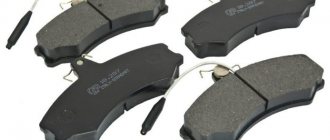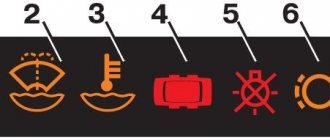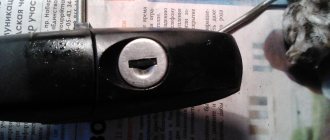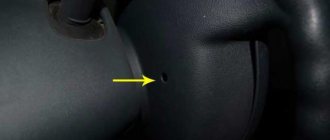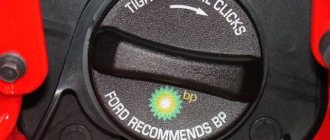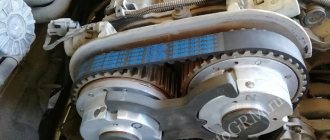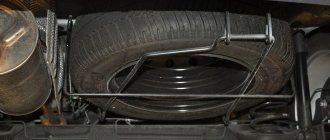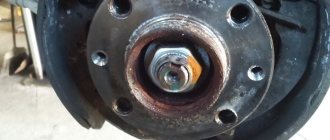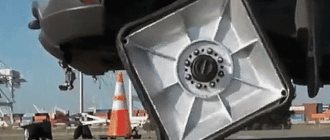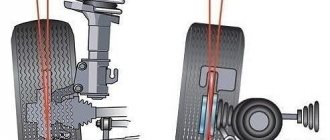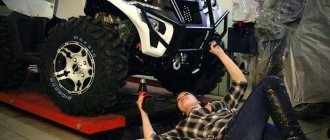Generator belt
The alternator belt is one of the most common causes of unpleasant noise. In this case, a whistle appears when the car is moving, that is, under load. However, after accelerating or accelerating, it may go away. Also, if a whistle is heard when the car is moving and disappears when braking, then the reason for this phenomenon is simple - belt slippage and severe wear.
It is easy to solve this problem yourself. In this case, you don’t even need to go to a service station. You just need to buy a new alternator belt and replace it. However, if the car is under warranty, it is best to contact a car service center. Also, on some foreign cars, the mounting of the generator is quite complicated. Therefore, not everyone will be able to remove it.
If such a whistle occurs when the car is moving in rainy weather or after driving through a puddle, then the reason may be even more trivial - the belt getting wet. In this case, you just need to wait until the part dries. After this, the whistle will go away on its own. There is no need to worry about this.
Expert opinion
The reason for the occurrence of squeaking when braking lies in the resonance phenomena that occur in the friction pair - the brake pad and disc. Manufacturers try to minimize noise during braking by installing anti-squeak plates on the back side of the pad, applying anti-noise mastic and adding special components to the friction mixture. But first of all, the manufacturer provides technical indicators - a stable friction coefficient of the brake pad as a guarantee of our safety.
I would like to note that whistles and squeaks do not in any way affect the quality of braking. They usually occur at the moment the pad touches the disc and in the final phase, when the brake pedal begins to be released. These are resonant phenomena that can appear and disappear depending on the temperature and humidity of the environment. But if squeaking accompanies the entire braking process and constantly gets on your nerves, I advise you to first stop by a service center and ask a mechanic to assess the condition of the pads and discs (drums). Sometimes it is enough to simply clean the surface of the friction lining (it may contain abrasive particles from road dust) or you may need to sharpen the discs to get rid of unpleasant sounds.
In cases where all other measures have been exhausted, I recommend replacing the brake pads. And don’t buy frankly cheap ones - they not only make a lot of noise, but also work ineffectively.
Did you like our site? Join or subscribe (you will receive notifications about new topics by email) to our channel in MirTesen!
Clutch problem
In modern cars, a problem such as clutch slippage can occur. This is most often observed in cars that are very actively used in the city with a difficult driving regime: frequent stops, starts, sudden increases in speed, etc. In this case, the clutch suffers greatly. After all, it is subjected to heavy loads when stopping and starting. Fixing a clutch-related whistling problem yourself is nearly impossible without specialized knowledge and tools.
However, you can try to determine whether the whistling sound when driving the car is actually due to this problem. To do this you need:
- Place the car on a small hill. This will create force when starting off. This way you can put more load on the motor when starting to move, which will allow you to hear the whistle better.
- Now you need to engage first gear and move off by slowly pressing the gas pedal. This way you can recognize the moment when the car starts to whistle.
- If there is a whistle when the car starts to move, that is, while the clutch is grasping, then this indicates a malfunction. To be sure, it is necessary to conduct several more similar tests. If in doubt, you can try to move off from second gear. This will increase the load on the clutch, and the whistle will be heard more clearly.
It is unrealistic to hear such a sound emanating from a node at speed. Therefore, if the whistle is clearly visible when starting, but is completely absent when driving at speed, then most likely the problem is in the clutch.
Extraneous noise - crunching: causes and methods of solving the problem
The CV joint can cause a crunching noise when turning the steering wheel.
Crunching is usually a consequence of small noises (clicks and clatters). It may be the result of a serious breakdown, or it may be a minor malfunction.
It happens that you hear a crunching sound when you turn the steering wheel while driving. At the same time, it seems that the car literally crunches. You often hear noise when turning in a certain direction.
Owners of front-wheel drive and all-wheel drive cars face this problem. The noise is associated with a broken grenade (CV joint).
You can check the crunch when turning the steering wheel in place.
Is repair possible?
It will only have to be repaired at a service station. Even with experience, it is difficult to understand modern gearbox and clutch systems. Therefore, it is better not to waste time, but to entrust such work to specialists. Most often it is not necessary to repair, but to change the clutch. However, for foreign cars such a solution can cost a lot of money. For example, a whistle when driving a Chevrolet Cruze car could be eliminated by replacing the entire clutch system. This is what they write on some auto forums. However, this does not mean at all that this problem is common in these machines.
Engine support cushions
Even modern engines are subject to strong vibrations when the vehicle moves. How does this manifest itself? The loads from vibrations are taken by the engine mounts, which are made of hard rubber. Thanks to these parts, vibrations are dampened, and the driver in the car practically does not feel them. The cushions also absorb loads associated with impacts on the vehicle's chassis. Such influences do not have a significant effect on the engine. However, cushions can deteriorate over time. One of the characteristic signs of this phenomenon is a whistle while the car is moving. It can also occur if at least one of the cushions is not properly tightened.
Brakes squeal due to pad vibration
If the brake pads squeak not as intensely as in the previous case, and this not the most pleasant sound does not irritate your teeth, then, as a rule, the reason lies in the vibration of the brakes. Most manufacturers, for example, Lada Kalina, produce special plates that are installed between the caliper piston and the pad itself - their purpose is to absorb vibrations and prevent unnecessary sounds when driving and braking. Its analogue can also be a special holder made of elastic materials.
The creaking starts if these anti-vibration parts are missing from the system for some reason.
Inexperienced drivers simply get rid of such an insignificant detail, and then suffer from the squealing of their own brakes, wondering what the root cause is.
How are pillows changed?
Replacing a pillow is a complex procedure. To do this, the engine is completely removed and hung on a winch. Then the pillow is unscrewed, inspected and, if necessary, replaced with a new one. After this, the motor is put in place. At the same time, it must be set very precisely, down to millimeters. If the installation of the power unit is not carried out very accurately, then vibrations will occur in the engine when turning or driving on a bad road. This makes it clear that it is almost impossible to replace the pillow yourself. This should only be done by professionals.
Knocking sound when turning the steering wheel
If the driver begins to notice a knocking sound when turning the steering wheel in place, this may be a sign of play in any unit. Most often this is due to natural wear and tear.
Noise may occur when parts rub.
Article on the topic: How to change the automatic transmission oil in a Ford Focus 2 yourself
If, by placing your hand on the bipod of the steering gear and swinging it in different directions, you feel play or hear a knock, you can fix the problem using the adjusting screw. This is a faulty steering linkage.
If, when you get closer to the tip of the steering joint, you wobble it and hear a knocking sound, you should replace the ball joint with a new one.
A knocking noise may occur when turning the steering wheel while driving. These could be completely different problems.
Timing belt
Let's go further and consider the timing belt as a possible cause of whistling and rattling. Note that the belt itself cannot whistle, but the whistle can come from the rollers and tensioners. Determining that the sound comes specifically from the timing belt is quite difficult. At a minimum, you can start the engine and just listen to the place where the belt is. If the whistle is pronounced and comes from this particular node, then you need to go to the service station. After all, you won’t be able to do anything on your own. As already written above, the problem here is not in the belt itself, but in the system, and simply replacing the timing belt will not achieve anything.
Other possible causes of whistling when driving a car
A whistling noise under the hood may be caused by the power steering. The problem occurs especially often in domestic cars. After all, the power steering system here is not designed in the best way. The air conditioner drive or coolant pump drive may also whistle. Axle shafts can rattle and make sounds if they move freely in CV joints. However, in this case the car should not only whistle, but also jerk when starting off.
In general, many elements under the hood of a car that accidentally become unscrewed or hit during a sharp increase in speed, hitting a hole, or abruptly starting can make an unpleasant sound. Completely unpredictable contacts can cause a car to whistle, and sometimes even specialists at a service station fail to identify them. Quite often, the whistle comes simply from the friction of some parts that do not play an important role in the system. Sometimes foreign objects can get under the hood, which, when vibrating, produce a characteristic sound, etc. Therefore, before starting extensive diagnostics at a service station, it is advisable to look under the hood yourself and check if there are any third-party objects that could create a whistle.
Why is grinding heard and how to deal with it
If you hear a grinding noise when you turn the steering wheel, this indicates wear on the steering system joints or front suspension. To find out the exact cause, it is worth carrying out diagnostics at a service station and replacing the failed spare part.
Article on the topic: When to change spark plugs
Noise can occur when turning the steering wheel: a grinding sound when driving, or when the car is stationary. The cause of this noise lies in the failure of the support bearings of the strut or lower ball joint.
If you hear a grinding noise in the wheel when you turn the steering wheel, there can be many reasons. Experienced drivers advise contacting a car mechanic, driving the car into an inspection pit and having a look. Among the reasons are:
- The rubber on the cardan outboard bearing is torn. Stones and rubble can get into it;
- The grinding noise may occur when the pads rub against the discs;
- Another reason could be a loose locking ring.
In sub-zero weather, when turning the steering wheel all the way, a grinding noise is heard due to lack of lubrication. In this case, additional application of lubricant will help.
What's the result?
You cannot leave a whistling sound in the engine and hope that it will go away on its own. Most likely, if you leave everything as is, then a malfunction of any system could lead to more serious problems with the engine in the future. Eliminating the whistle at an early stage will avoid high costs for engine repairs. So be sure to listen to the engine. If you find any strange whistling, try to determine more precisely where it is coming from. And if you can’t do this, then go to a service station. Let the professionals deal with this.
However, some car owners are not bothered by various extraneous noises from engines at all. They successfully drive cars that not only emit an unpleasant whistle, but also jerk when driving, accelerate and brake poorly. What can we say about some kind of whistle, which few people will pay attention to! But the vehicle is still worth checking.
Reading time: 6 minutes
Sometimes a motorist may hear a whistling wheel when driving a vehicle. This situation cannot be ignored; it is important to find out the cause and fix the problem.
Wheel whine when driving
Car owners are always nervous when they hear various sounds arising from their favorite car. Sometimes outside noise does not promise anything serious. But there are also difficult situations that can provoke an accident on the road.
Diagnostics in a car service center
It is important to understand why tires whistle when cornering and what to do about it. Initially, if noise develops, you should go to a service station or diagnose the car yourself. It is necessary to find out the real cause of the defect and eliminate it.
Wheel whistling: reasons
If you hear a whistle or the wheel squeaks when turning, this may indicate problems with the brake system. A whistling sound in the wheel or pads when driving can make the driver seriously worried.
What causes tires to squeal when driving? What causes a malfunction in the brake pads? Poor quality spare parts and the material from which the parts are made. This causes wear, and the wheel begins to whistle when driving.
Do poor quality pads break quickly? In this case, it is necessary to carry out a replacement, since repair is a pointless exercise. You need to replace the spare part with an original, expensive one, or you will have to change the brake disc itself.
Completely replacing both the disc and pad is an expensive process. In order not to spend too much, as soon as it starts whistling and it becomes clear that the problem is worn out pads, you need to equip the car with good “stuffing”.
A slight whistle is observed when the tire is punctured. The problem may be in the engine, the belt, and the whistling sound will be heard from under the wheels. To avoid an unforeseen situation, you should carry out machine maintenance and diagnostics at a car service center.
Wheel braking system
If a person understands cars, then he can identify the breakdown on his own. When a decision is made to change car pads or a disc, it is better to buy spare parts of the same brand from a catalog.
Creaking noise when turning the steering wheel
Diagnosis of squeaking noise when turning the steering wheel
When operating the steering wheel, you can often hear a squeak when turning the steering wheel in place. There can be many reasons for this.
- The outer hinges are worn. If so, they just need to be replaced.
- The front wheel bearings are worn out. It is also possible that the hub nut may become loose. To solve the problem, you need to tighten the nuts or, if necessary, replace the bearings.
- A spring creaking when turning the steering wheel to the right, or a creaking sound when turning the steering wheel to the left may be caused by its breakdown. Replacing the spring with a pair will solve the problem.
- Loosening the bolts securing the wheel, the stabilizer bar to the body, the front suspension steering knuckle to the strut, the nuts of the silent blocks of the suspension arms.
For your peace of mind, it is better to show the car to an experienced car mechanic. He will drive the car into the inspection hole and will be able to accurately identify the breakdown or malfunction and quickly fix it.
Wheel whistling when cornering at low speed: replacing pads
To replace the front brake pads, the car must first be jacked up and the tire removed. Next you need to do this:
- Find the stopper plate of the lower bolt securing the wheel cylinder to the guide pin and carefully bend the edges. You should work with an open-end wrench 17 and 13. This will remove the bolt from below and remove it together with the plate.
- Then you should pick up the caliper with a screwdriver and lift it up together with the cylinder. It is necessary to remove them from the guide block.
- Remove worn parts and install those purchased from a specialized store.
This is done in various ways. First, using pliers or a gas wrench, you need to press the piston lower into the cylinder. You can also install the outer auto pad back and lower the caliper into working condition. Using any metal rod, for example, a mounting blade, a support is made on the disk and the piston is pressed.
There is a parts wear sensor located on the inner auto block. However, it is also present in the new kit, so you need to cut out the electrical wires of the old sensor using side cutters. You also need to disconnect the electrical connector of the electric sensor, then remove its wire from the rings covering the brake hose. When new parts are installed, you need to connect the connector of the wear sensor and the car wiring, then thread its electrical wires through a rubber ring, and insert the tip of the sensor into the hole inside the car pad.
How to quickly and effectively get rid of annoying noise, is repair possible?
A whistle may be heard from the checkpoint. In this case, only service center technicians should carry out repairs. It’s right not to waste time, but to trust the professionals in your field. Usually you do not have to carry out repairs, but simply change the clutch. But for foreign cars, such a decision can promise large financial expenses. For example, whistling noise when driving a Chevrolet Cruze car could only be eliminated by replacing the entire clutch system. But this does not mean that only such a problem can arise in these cars.
Some car owners are not at all interested in extraneous car sounds. They drive cars that not only whistle, but also vibrate, brake poorly and pick up speed, especially not taking into account slight whistling, but the right decision is to check the car.
It is important to understand that you need to react quickly to a whistling wheel when turning. A responsible attitude will extend the life of your vehicle and protect you from accidents.
Causes of extraneous sounds
Causes of extraneous sounds when turning the steering wheel
There are many reasons that can cause noise, among them the most common are:
- Steering rack malfunction . Its wear or loosening.
- Steering column and problems associated with it.
- Malfunctions of suspension elements . These could be shock strut support bearings that require replacement, or ball joints.
- There is a problem with anthers . After they rupture, water and dirt enter the drive mechanism and cause it to malfunction. Therefore, a torn boot should be replaced immediately.
Whistle in the front left wheel.
Actually, this flaw came out this evening when approaching the house (1 km remained). This whistle appears when driving, at any speed (even coasting). And only in the left front wheel (my wife came out and listened to where the squeak/whistle was coming from). My guess is that the pads are worn out. Maybe someone will have other assumptions? Or are there people who have encountered such a problem? Thanks for the answers/advice.
I've done everything. As expected, these were pads. I put the original.
Did they whistle without braking?
And standing at idle?
